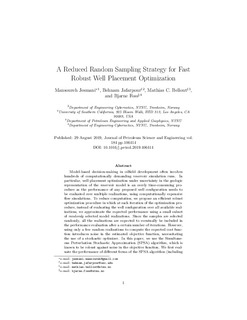A reduced random sampling strategy for fast robust well placement optimization
Journal article, Peer reviewed
Accepted version

Åpne
Permanent lenke
http://hdl.handle.net/11250/2617590Utgivelsesdato
2019Metadata
Vis full innførselSamlinger
Originalversjon
https://doi.org/10.1016/j.petrol.2019.106414Sammendrag
Model-based decision-making in oilfield development often involves hundreds of computationally demanding reservoir simulation runs. In particular, well placement optimization under uncertainty in the geologic representation of the reservoir model is an overly time-consuming procedure as the performance of any proposed well configuration needs to be evaluated over multiple realizations, using computationally expensive flow simulations. To reduce computation, we propose an efficient robust optimization procedure in which at each iteration of the optimization procedure, instead of evaluating the well configuration over all available realizations, we approximate the expected performance using a small subset of randomly selected model realizations. Since the samples are selected randomly, all the realizations are expected to eventually be included in the performance evaluation after a certain number of iterations. However, using only a few random realizations to compute the expected cost function introduces noise in the estimated objective function, necessitating the use of a stochastic optimizer. In this paper, we use the Simultaneous Perturbation Stochastic Approximation (SPSA) algorithm, which is known to be robust against noise in the objective function. We first evaluate the performance of different forms of the SPSA algorithm (including discrete, continuous, and adaptive) using several numerical experiments, followed by a discussion of the properties of the proposed reduced random sampling approach and comparison with global optimization techniques. The method is applied to several numerical experiments, including case studies involving vertical, horizontal, and lateral wells, to evaluate its performance. The results from these experiments indicate that the reduced random sampling approach can provide significant computational gain with minimal impact on the attained optimization performance.
